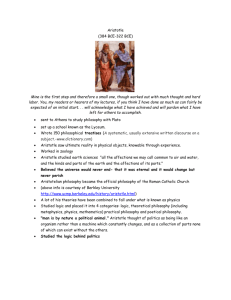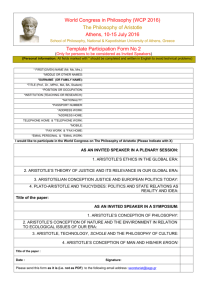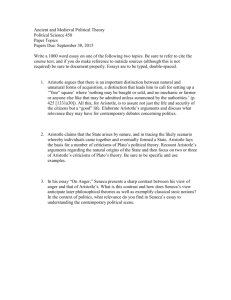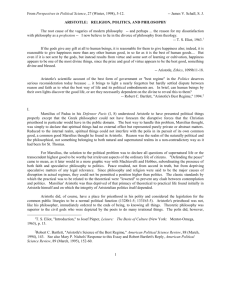Aristotle`s Theory of Knowledge - S-Brown
advertisement
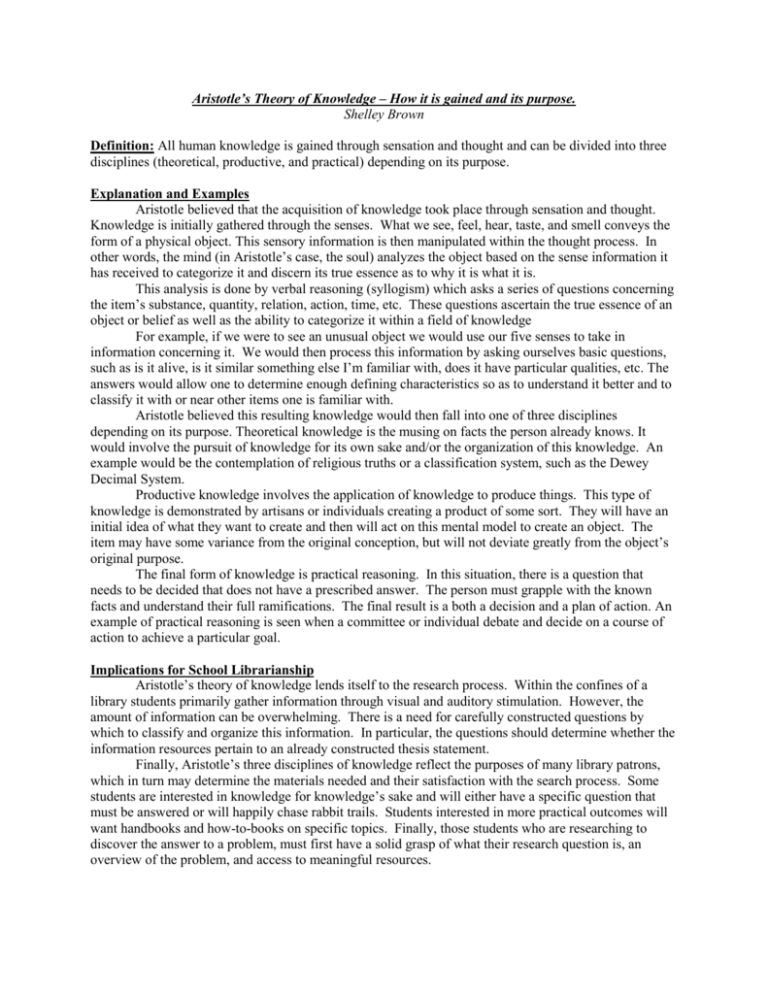
Aristotle’s Theory of Knowledge – How it is gained and its purpose. Shelley Brown Definition: All human knowledge is gained through sensation and thought and can be divided into three disciplines (theoretical, productive, and practical) depending on its purpose. Explanation and Examples Aristotle believed that the acquisition of knowledge took place through sensation and thought. Knowledge is initially gathered through the senses. What we see, feel, hear, taste, and smell conveys the form of a physical object. This sensory information is then manipulated within the thought process. In other words, the mind (in Aristotle’s case, the soul) analyzes the object based on the sense information it has received to categorize it and discern its true essence as to why it is what it is. This analysis is done by verbal reasoning (syllogism) which asks a series of questions concerning the item’s substance, quantity, relation, action, time, etc. These questions ascertain the true essence of an object or belief as well as the ability to categorize it within a field of knowledge For example, if we were to see an unusual object we would use our five senses to take in information concerning it. We would then process this information by asking ourselves basic questions, such as is it alive, is it similar something else I’m familiar with, does it have particular qualities, etc. The answers would allow one to determine enough defining characteristics so as to understand it better and to classify it with or near other items one is familiar with. Aristotle believed this resulting knowledge would then fall into one of three disciplines depending on its purpose. Theoretical knowledge is the musing on facts the person already knows. It would involve the pursuit of knowledge for its own sake and/or the organization of this knowledge. An example would be the contemplation of religious truths or a classification system, such as the Dewey Decimal System. Productive knowledge involves the application of knowledge to produce things. This type of knowledge is demonstrated by artisans or individuals creating a product of some sort. They will have an initial idea of what they want to create and then will act on this mental model to create an object. The item may have some variance from the original conception, but will not deviate greatly from the object’s original purpose. The final form of knowledge is practical reasoning. In this situation, there is a question that needs to be decided that does not have a prescribed answer. The person must grapple with the known facts and understand their full ramifications. The final result is a both a decision and a plan of action. An example of practical reasoning is seen when a committee or individual debate and decide on a course of action to achieve a particular goal. Implications for School Librarianship Aristotle’s theory of knowledge lends itself to the research process. Within the confines of a library students primarily gather information through visual and auditory stimulation. However, the amount of information can be overwhelming. There is a need for carefully constructed questions by which to classify and organize this information. In particular, the questions should determine whether the information resources pertain to an already constructed thesis statement. Finally, Aristotle’s three disciplines of knowledge reflect the purposes of many library patrons, which in turn may determine the materials needed and their satisfaction with the search process. Some students are interested in knowledge for knowledge’s sake and will either have a specific question that must be answered or will happily chase rabbit trails. Students interested in more practical outcomes will want handbooks and how-to-books on specific topics. Finally, those students who are researching to discover the answer to a problem, must first have a solid grasp of what their research question is, an overview of the problem, and access to meaningful resources. *Clip art pictures are from: http://office.microsoft.com/en-us/ Sources “Aristotle (384—322 B.C.E.).” Internet Encyclopedia of Philosophy. 2005. Web. 17 February 2014. http://www.iep.utm.edu/aristotl/ Groarke, Louis F. “Aristotle: Logic.” Internet Encyclopedia of Philosophy. 2011. Web. 17 February 2014. http://www.iep.utm.edu/aris-log/ Kemerling, Garth. “Aristotle: Forms and Souls.” The Philosophy Pages. 12 November 2011. Web. 17 February 2014. http://www.philosophypages.com/hy/2p.htm Smith, M. K “Aristotle on knowledge.” The Encyclopaedia of Informal Education. 1999. Web. 17 February 2014. http://infed.org/mobi/aristotle-on-knowledge/

